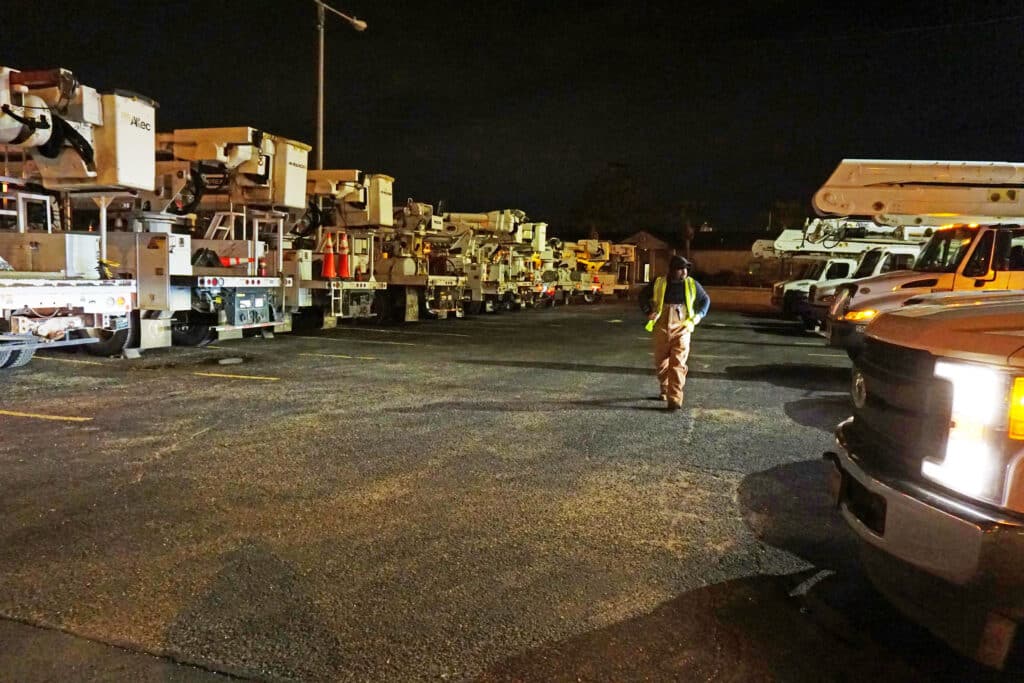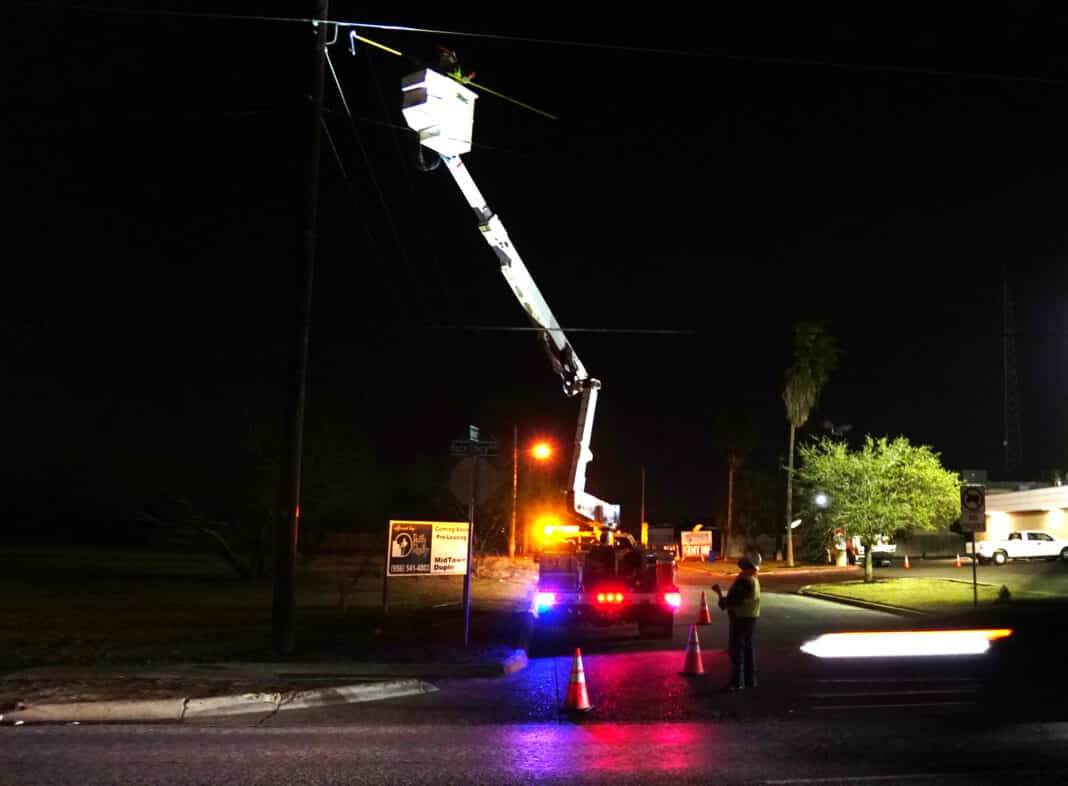During a Feb. 18 press conference hours after the Electric Reliability Council of Texas informed the Brownsville Public Utilities Board that it would no longer be subject to ERCOT-mandated rolling blackouts during the week’s prolonged cold snap, BPUB General Manager and CEO John Bruciak expressed fear that the city-owned utility’s customers could get hit with huge bills because of how much it had to pay for natural gas to run its generating units during the extreme weather event.
But it looks like that’s not likely to happen after all, Bruciak said Thursday in an interview with the Herald. In the midst of the cold snap, with BPUB and the city still in emergency mode and many customers still without power, it was impossible to know for sure how things would play out, he said.
“Since then preliminary numbers have come in,” Bruciak said. “We know what our sales were, we know what our costs were, and we’ve got a certain deficit on that. The best we can tell, that can be mitigated through cash on hand, reserves and possibly some short-term financing. … Again, the numbers can change, but we’re not planning to pass that along to the customers. We’ve got adequate funding mechanisms here to do it without either adjusting the rates or the fuel charge or anything else.”
A report from Moody’s Investors Service noted that, while BPUB was generally able to keep generating and producing power during the cold snap, it “incurred unbudgeted natural gas and power purchases, resulting in an estimated shortfall of $32.1 million.”
Additionally, some power purchasers couldn’t pay the full amount for electricity during the crisis, creating a total market shortfall of $1.6 billion. BPUB wound up getting $7.8 million less than it was owed for power it sold on the market, according to Moody’s. The utility will recover the “short pay” over an extended period, while BPUB’s total $39.9 million shortfall is manageable considering the utility’s “strong liquidity and limited leverage,” the report said. In other words, BPUB has plenty of cash on hand and doesn’t owe too much money.
Moody’s predicted that Texas utilities facing shortfalls weren’t likely to pass the costs on to customers right away “since rate increases large enough to cover the costs might prompt a backlash, especially since consumers are faced with coronavirus-induced economic turmoil.”
“We don’t want to burden the customer if we can help it,” Bruciak said.

Most of BPUB’s shortfall was due to exorbitant gas prices during the cold snap, he said. The utility normally buys its natural gas for around $2.50 per MMBtu (1 million British Thermal Unit), though during the weather event it went up to $400 per MMBtu a 20,000 percent increase that bumped the cost of running a generating unit from $30 per megawatt hour to $3,000 per megawatt hour, Bruciak said. ERCOT caps the price of a megawatt hour at $9,000.
“There are no caps on the gas side,” Bruciak said. “I think that needs to be looked at.”
Even with a $39.9 million shortfall, BPUB came out fine compared to other utilities and co-ops around the state that owe hundreds of millions of dollars for fuel charges and/or have gone bankrupt, he said. For those entities it’s either pay up or be cut off from the gas they need to generate electricity, Bruciak said.
ERCOT implemented rolling blackouts statewide because so much power generation was lost during the cold weather. Bruciak said 158 power plants went down due to a lack of winterization of the plants, gas supply lines and renewable energy facilities in the northern part of the state, where temperatures plunged to single digits in some places.
A number of the plants that went down this time also failed during the last major winter storm to hit the state, in 2011, though the owners did nothing to address the issue despite a warning from the North American Electric Reliability Council that it would happen again in the event of another major winter storm.
This kind of thing is not an issue in the Northeast, where winterized gas power plants and wind turbines and pipelines continue to operate during the worst winter extremes, Bruciak said. He said it’s all bound to come out as ERCOT, the Public Utilities Commission and the Legislature look into what went wrong and why.
“They’re doing a deep dive into that right now, but I think the biggest thing was winterization,” Bruciak said. “These plants didn’t run because of the extreme cold. That’s got to be looked at on a statewide basis, because if those turbines ran and those plants ran we wouldn’t have had any problem.”
Brownsville’s rolling blackouts weren’t supposed to affect a particular area, or circuit, for more two hours at a time once implemented, though hundreds of BPUB customers endured consecutive days without power in many instances. Fernando Saenz, BPUB chief operating officer, said it was largely due to too many residents leaving their HVAC heaters on after having their power cut.
This imposed a high load on a particular feeder the moment it was re-energized, often causing blown fuses and transformers, he said. Fifty of BPUB’s 53 feeders were involved in the rolling blackouts, Saenz said, noting that crews worked round the clock trying to restore power to customers and deal with trouble spots.
Toward the end BPUB was able to bring in seven crews from outside to help fix damaged transformers and poles that had caught fire and get residents’ power back on, he said.
“I know a lot of the public sentiment is that we weren’t trying hard enough, but our guys did everything they could,” Saenz said. “It was nice and cold on top of those bucket trucks. They had families too that were home without power.”
Despite the problems, BPUB prepared well in advance for the cold snap, securing a supply of natural gas, fueling up generating units at the utility’s Silas Ray Power Station in West Brownsville, quickly reassembling a unit that had been disassembled for maintenance, topping off chemicals at the utility’s water and wastewater plants in case they became unavailable, and keeping those plants powered up to avoid further complications, he said.
“Essentially if you cut off the water supply then you multiply your problems significantly,” Saenz said. “If you stop the flow of water at a plant and then it freezes up and then you start it up, then you’re going to blow gaskets, burn motors, break pumps.”
While BPUB planned well for the cold snap, the entire is being reviewed by staff to find out could or should have been done differently, he said. Once that process is complete, those solutions will be implemented, Saenz said.
“We’re doing a deep dive right now on the event, from top to bottom,” Bruciak said. “I think there’s some things we can do better. The communication part, letting the customer know.”
One major complaint was that, while customers generally understood the need for rolling blackouts during the emergency, they weren’t happy about not knowing when they would occur and how long they would last, he said. BPUB plans to implement an outage management system before hurricane season that will give customers immediate access to that kind of information, Bruciak said.
The mutual aid agreements utilities have with each other statewide means Brownsville can rely on outside help after a hurricane, but in this case there was no one to call because the entire state was dealing with the weather emergency, he said. For that reason BPUB may keep an outside utility contractor on retainer going forward, Bruciak said.
“You can’t get those contractors in a storm event, because they’re already gone,” he said. “Somebody’s already got them.”
Bruciak said having an extra seven or 10 crews from the get-go in mid-February would have been very helpful in getting customers’ electricity restored faster — as it was last month when outside help finally did arrive. The effort was coordinated, with BPUB crews delivering the necessary materials to each location in advance so the contract crews could install it quickly before moving on to the next trouble spot.
“We broke the city up into quadrants,” Bruciak said. “Each crew worked a quadrant. If there was an outage they stayed there until that quadrant was fixed. We learned a lot on that. We’re going to make those changes before the next event, for sure.”





